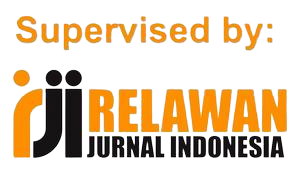The Use of Eco-Friendly Products in Indonesia: A Survey on Consumers Motivation
Abstract
The Use of Eco-Friendly Products in Indonesia: A Survey on Consumers Motivation. The use of products labeled as environmentally friendly is now on the rise in Indonesia. The use of products labeled as environmentally friendly is now on the rise in Indonesia. However, while the increasing sales of environmentally friendly products happen, public awareness of environmental sustainability has not yet improved. This paper aims to determine the factors that influence the rise of a trend, namely the use of environmentally friendly products, which has recently been rife in Indonesia. Thus, this study begins the investigation by distributing a questionnaire that uses quantitative methods and a Likert scale in data collection, with results coming from 63 Indonesian from various backgrounds. From the data, it can be concluded that of the three variables used, which are Environmental Awareness, FOMO (Fear of Missing Out), and Affordability, there is only one variable, FOMO that significantly influences the buyers’ motivation for eco-friendly products. Hence, FOMO should be considered an important aspect regarding marketing or campaign.
Keywords
Full Text:
PDFReferences
Abel, J. P. & Buff, C. L. (2016). Social Media and the Fear of Missing Out: Scale Development and Assessment. Journal of Business & Economics Research, 14(1), 33-44.
Agyeman, C. M. (2014). Consumers’ Buying Behavior Towards Green Products: An Exploratory Study. International Journal of Management Research and Business Strategy, 3(1), 188-197.
Al-Swidi, A. K., Mohammed, S., & Huque, R. (2004). The Role of Subjective Norms in Theory of Planned Behavior in the Context of Organic Food Consumption. British Food Journal, 116(10), 1561-1580.
Albayrak, T., Aksoy, Ş., & Caber, M. (2013). The Effect of Environmental Concern and Scepticism on Green Purchase Behaviour. Marketing Intelligence and Planning, 31(1), 27-39.
Bauer, A-S., Tacker, M., Uysal-Unalan, I., Cruz, R. M. S., Varzakas, T., & Krauter, V. (2021). Recyclability and Redesign Challenges in Multilayer Flexible Food Packaging – A Review. Foods, 10(11), 1-17.
Cheung, R., Lau, M. M., & Lam, A. Y. C. (2015). Bridging Asia and the World Factors Affecting Consumer Attitude Towards Organic Food: An Empirical Study in Hong Kong. Journal of Global Scholars of Marketing Science, 25(3), 216-231.
Grothe, A. (2017). From Beginning to the End: Humans as Caretakers and Co-Creators of Nature. Humans in Nature, 4, 1-6.
Hamid, I. & Waris, I. (2018). Eco Labels and Eco Conscious Consumer Behavior: The Mediating Effect of Green Trust and Environmental Concern. Journal of Management Sciences, 592, 86-105.
Handayani, I. (2021). Kepedulian Masyarakat Produk Ramah Lingkungan Naik 112 Persen. investor.id. https://investor.id/lifestyle/251356/kepedulian-masyarakat-produk-ramah-lingkungan-naik-112.
Hauschild, M. Z., Kara, S., & Røpke, I. (2020). Absolute Sustainability: Challenges to Life Cycle Engineering. CIRP Annals, 69(2), 533-553.
Hinton, P., McMurray, I., & Brownlow, C. (2014). SPSS Explained. Routledge.
Imancezar, R. G. & Khasanah, I. (2011). Analisis Pengaruh Motivasi Konsumen, Persepsi Konsumen, dan Sikap Konsumen terhadap Keputusan Pembelian (Studi Pada Distro Districtsides di Semarang). Doctoral Dissertation, Universitas Diponegoro). http://eprints.undip.ac.id/28956/
Ivan, M. (2022). Indonesia Hasilkan 21,88 Juta ton Sampah pada 2021. Dataindonesia.id. https://dataindonesia.id/ragam/detail/indonesia-hasilkan-2188-juta-ton-sampah-pada-2021.
Junaedi, M. S. (2015). Pengaruh Kesadaran Lingkungan pada Niat Beli Produk Hijau: Studi Perilaku Konsumen Berwawasan Lingkungan. Benefit: Jurnal Manajemen dan Bisnis, 9(2), 189-201.
JWTIntelligence (2012). Fear of Missing Out (FOMO). JWT. http://www.jwtintelligence.com/wp-content/uploads/2012/03/F_JWT_FOMO-update_3.21.12.pdf
Kler, R., Prasad, S., Prasad, A. B., Goswami, R., & Mitra, G. S. (2022). Factors Affecting Consumer Buying Motivations: An Empirical Study in the Behavioral Economics Perspectives. Journal of Positive School Psychology, 6(2), 711-717.
Khuzaimah, A. N. B., Bin Taslim, F. A., Binti Zabri, I. F., Jia, K. J., Ganamoorthi, K. R., Ling, L. E., Bin Abu Samah, M. A., Krishnan, I. A., Muthutamilselvan, K., Kanan, V. N., Ramalingam, S., & Maruthai, E. (2020). Malaysian Journal of Social Sciences and Humanities, 5(5), 44-59.
Kianpour, K., Anvari, R., Jusoh, A., & Othman, M. F. (2014). Important Motivators for Buying Green Products. Intangible Capital, 10(5), 873–896.
Nurhayati, H. (2021). Indonesia: Retail sales value of supermarket chains 2020. Statista. https://www.statista.com/statistics/1227925/indonesia-retail-sales-value-of-supermarket-chains/.
Putra, A. H. & Citroatmojo, S. S. (2021). Analisis Perilaku Aman Tenaga Kerja pada PT Meindo Elang Indah. Journal of Applied Management Research, 1(1), 11-23.
Van Tonder, E. & Petzer, D. J. (2018). The Interrelationships Between Relationship Marketing Constructs and Customer Engagement Dimensions. The Service Industries Journal, 38(13-14), 948-973.
Paramita, N. D., & Yasa, N. N. K. (2015). Sikap dalam Memediasi Hubungan Kesadaran Lingkungan dengan Niat Beli Produk Kosmetik Ramah Lingkungan. Jurnal Manajemen dan Kewirausahaan, 17(2), 187-195.
Prayoga, I. M. S., Adiyadnya, M. S. P., & Putra, B. N. K. (2020). Green Awareness Effect on Consumers’ Purchasing Decision. Asia-Pacific Management and Business Application, 8(3), 199-208.
Przybylski, A. K., Murayama, K., Dehaan, C. R., & Gladwell, V. (2013). Motivational, Emotional, and Behavioral Correlates of Fear of Missing Out. Computers in Human Behavior, 29(4), 1841-1848.
Redman, Q. (2012). Why Affordability is a Systems Engineering Metric. Procedia Computer Science, 8, 376-381.
Rozalinna, G. M. & Lukman, A. C. (2022). Konsumsi Produk Sustainable Beauty di Masa Pandemi: Menjaga Kesadaran Ekologis ataukah FOMO (Fear of Missing Out)?, Brawijaya Journal of Social Science, 1(2), 57-79.
Shrestha, N. (2020). Detecting Multicollinearity in Regression Analysis. American Journal of Applied Mathematics and Statistics, 8, 39-42.
Surya, D. & Aulina, D. (2020). Self-Regulation as a Predictor of Fear of Missing Out in Emerging Adulthood. Indonesian Journal of Psychological Research, 1(1), 1-5.
Thang, D. & Tan, B. (2003). Linking Consumer Perception to Preference of Retail Stores: An Empirical Assessment of the Multi-Attributes of Store Image. Journal of Retailing and Consumer Services, 10, 193-200.
Yue, B., Sheng G., She, S., & Xu, J. (2020). Impact of Consumer Environmental Responsibility on Green Consumption Behavior in China: The Role of Environmental Concern and Price Sensitivity. Sustainability, 12(5), 2074.
Yuen, K. F., Wang, X., Ma, F., & Li, K. X. (2020). The Psychological Causes of Panic Buying Following a Health Crisis. International Journal of Environmental Research and Public Health, 17, 3513.
Zhang, L. & Zhou, H. (2019). The Optimal Green Product Design with Cost Constraint and Sustainable Policies for the Manufacturer. Mathematical Problems in Engineering, 2019, 1-14.
DOI: https://doi.org/10.36441/jamr.v2i2.1304
Article Metrics
Abstract views : 768 times
PDF views : 421 times
Dimension Citation Metrics
Refbacks
- There are currently no refbacks.
Copyright (c) 2022 Nabiel Elhakim Al-Ahmad Bit, Mona Chaterina, Christian Haposan Pangaribuan
Article Metrics
Abstract views : 768 timesPDF views : 421 times
Dimension Citation Metrics
Refbacks
- There are currently no refbacks.
Copyright (c) 2022 Nabiel Elhakim Al-Ahmad Bit, Mona Chaterina, Christian Haposan Pangaribuan
Refbacks
- There are currently no refbacks.
Copyright (c) 2022 Nabiel Elhakim Al-Ahmad Bit, Mona Chaterina, Christian Haposan Pangaribuan
Indexing and Abstracting
Journal of Applied Management Research is indexed and abstracted in the following databases:
Cataloging
JAMR is also available on several library catalogues:

Copyright ©2021 Journal of Applied Management Research (JAMR). This work is licensed under a Creative Commons Attribution-NonCommercial-ShareAlike 4.0 International License.























